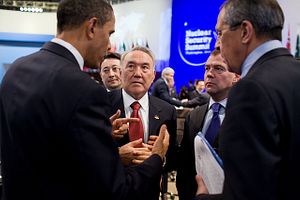Kazakhstan’s President Nursultan Nazarbayev joined other world leaders in Washington recently to further fortify the world against nuclear terrorism. In addition to contributing to all the main summit achievements, the governments of Kazakhstan and the United States “confirmed a shared commitment to implementing practical measures to strengthen the nuclear nonproliferation regime and enhance nuclear security.”
During the summit, as earlier, foreign leaders paid tribute to Kazakhstan’s record on de-nuclearization. For example, the leaders of the U.S., the U.K., and more than a dozen other governments affirmed that, “Kazakhstan has an exemplary record of contributing to nuclear nonproliferation and international peace.”
Indeed, nuclear disarmament and nonproliferation have been cornerstones of Kazakhstan’s partnership with Washington since independence. The U.S. has provided Kazakhstan with important financial and technical assistance to eliminate its nuclear warheads, weapons-grade materials, and supporting infrastructure. Meanwhile, Kazakhstan has helped the U.S. prevent other countries from obtaining nuclear weapons and terrorists from acquiring dangerous nuclear technologies or materials.
In one of the new government’s first major decisions, Nazarbayev closed the Soviet nuclear test site at Semipalatinsk (Semei), where 456 nuclear tests had been conducted by the Soviet military.
The Soviet Union’s collapse had also left more than 1,000 ballistic missiles and some 1,400 nuclear warheads on the territory of newly independent Kazakhstan. With that, the country inherited the fourth-largest nuclear arsenal in the world – larger than the British, French, or the Chinese arsenal at the time.
Working closely with the United States, Kazakhstan eliminated its nuclear arsenal, partly handing it over to Russia and partly dismantling it under international supervision. That work was complete by 1995, by which time Kazakhstan had already joined the Nuclear Non-Proliferation Treaty (NPT) as a no-nuclear-weapon state.
Kazakhstan also rapidly negotiated a Comprehensive Safeguards Agreement with the International Atomic Energy Agency (IAEA) and then signed the Agency’s Additional Protocol, which grants IAEA personnel the right to monitor a wider range of possible nuclear activities than the standard safeguard agreement, which addresses only declared nuclear sites.
With U.S. help, Kazakhstan has just finished converting its VVR-K research reactor at the Institute of Nuclear Physics (INP) from using highly enriched uranium (HEU) fuel to employing less proliferation-prone low enriched uranium fuel. They also eliminated some unused HEU fuel stocks and prepared to transfer the spent HEU fuel to Russia.
Both countries are about to complete construction of a Nuclear Security Training Center (NSTC) that could teach nuclear personnel from Kazakhstan and other countries how to strengthen their material protection, control, and accounting and counter nuclear and radioactive trafficking.
Kazakhstan is the world’s biggest producer and exporter of natural uranium, giving it a major role in the global nuclear energy sector. In addition to mining and exporting natural uranium, the country manufactures nuclear fuel pellets and the national nuclear corporation, Kazatomprom, wants to export more value-added products in the future, such as fuel for commercial reactors.
In 2015, Kazakhstan signed an agreement with the IAEA to host the Agency’s Low-Enriched Uranium (LEU) Bank in Kazakhstan. Due to operate from 2017 onward with uranium mined in Kazakhstan, the Bank will supply LEU nuclear fuel to countries that develop civilian nuclear energy while meeting all non-proliferation requirements. The repository will therefore serve as an important mechanism for assuring the supply of nuclear fuel to countries that want to pursue peaceful nuclear projects without incurring the financial costs and proliferation risks of making their own fuel.
Shortly before the official nuclear security summit convened, the nuclear industry held its own conference and discussed ways to make nuclear power production safer and more secure through improved technologies, licensing procedures, and other measures. Kazakhstani representatives also participated in the NGO summit, which proposed ways to accelerate progress towards reducing fissile materials, strengthening the security of radiological sources, and building a stronger institutional and legal framework for nuclear security.
From another perspective, Kazakhstan’s “multi-vector” policy is a creative design to promote regional stability while multiplying the sources of international support for Kazakhstan’s secure development – two other goals of Kazakhstan’s partnership with the United States. Meanwhile, massive Chinese investments in Kazakhstan – both ongoing and planned ahead – are turning China into a stakeholder in Kazakhstan’s sovereignty and security, providing Kazakhstan with wider political and economic leeway vis-a-vis Russia. Last year, the European Union collectively became Kazakhstan’s largest trade partner and source of foreign direct investment. In December 2015 Kazakhstan became the first Central Asian country to sign an Enhanced Partnership and Cooperation Agreement with the EU.
Turning to the future, the Kazakhstan-U.S. nonproliferation partnership should now focus on constructing a sustainable nuclear security architecture, ensuring that Iran and North Korea meet their nonproliferation obligations, and promoting the safe and secure use of nuclear energy in Eurasia and beyond.
Vladimir Socor is a senior fellow with The Jamestown Foundation in Washington. Richard Weitz is a non-proliferation and nuclear security expert in Washington. Daniel Witt is the president of the International Tax & Investment Center in Washington.
































